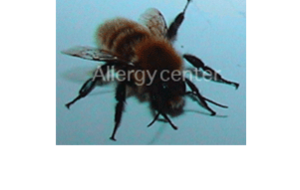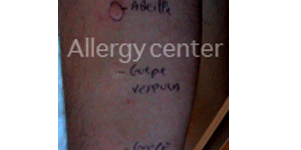It is caused most often by bee stings, wasps, hornets or bumblebees.
Clinical reactions are the most common local reactions that can be extended.
Systemic reactions such as generalized urticaria, angioedema, asthma, or even anaphylactic shock can be observed with the possibility of rapid death within minutes of the sting.
Bee

Wasp

TUNISIAN CENTER FOR EXPLORATION OF ALLERGIC DISEASES
Positive intradermal reaction to bee venom, wasp venom negative and paper wasp Vespula in a patient with anaphylactic shock due to an insect bite.

Desensitization shall be indicated in cases of severe reaction to decrease the frequency and severity of recurrences. It is effective in 90% of cases.
It can be done only by a specialized doctor with experience in this therapeutic and under strict medical supervision.
This desensitization is done in a morning, but injections are necessary reminders at regular intervals and this for at least 3 to 5 years.
A specific IgE is necessary if desensitization is considered, it will monitor the allergy.
Preventive measures can be proposed:
• Do not leave bare foot
• To protect the clothing covering the body and hair if it requires the presence of flying insects.
• Avoid colored clothes that attract bees and wasps.
• Do not use perfumes, scented shampoos and other cosmetics too attractive.
• Never shake or be aggressive in the presence of bees